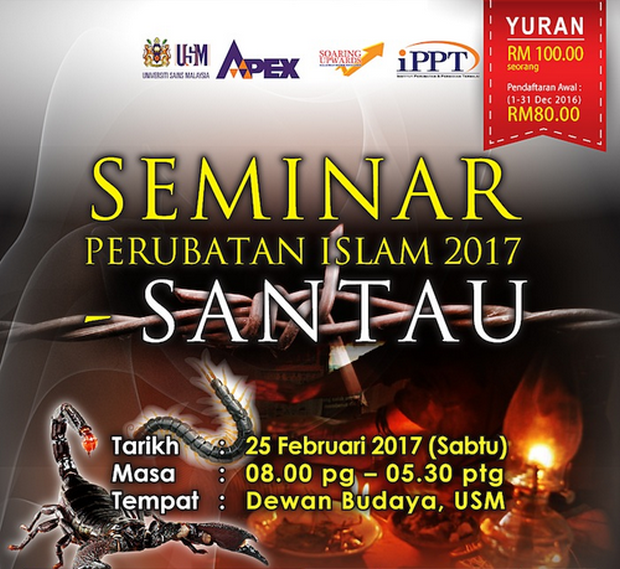KUALA LUMPUR, Jan 2 — Come February, Universiti Sains Malaysia (USM) in Penang will hold an inaugural day-long seminar aiming to explain the so-called scientific aspects behind “santau”, the Malay supernatural act of curse and poisoning.
The seminar, organised by its Advanced Medical and Dental Institute (IPPT), will feature religious speakers from Selangor International Islamic University College (KUIS) and the Penang chapter of popular faith healers Darussyifa’.
“I was thinking that it is good for me to explore santau, so the public will no longer fear it. They would know what is ‘santau’, and how to overcome the problem,” programme director Dr Hasni Arsad, who teaches molecular biology in IPPT, told Malay Mail Online.
“We are aware that santau is a combination of physical and spiritual aspects. So when we discuss this in a university setting, we have to expose it from a scientific aspect.”
In Malay culture, “santau” is an act of delivering curse and poison through black magic, among others by getting the victim to ingest a mixture of poison and shards, directing a djinn to infiltrate the victim’s body, or to bury a cursed object nearby the victim’s location.
Hasni, who is one of the speakers in the seminar, researches the potential of traditional herbs to cure cancer, and wrote a dissertation on “protein structure prediction” for his doctorate.
He also practises Islamic alternative healing semi-regularly at Darussyifa’ Penang.
Hasni said his combined experience in the two fields will be the basis of the seminar. He admitted his research on “santau” has neither been published nor peer-reviewed, and instead will be presenting relevant findings from journals already published by other authors.
He said he will present the treatment for santau in three aspects: light, Quran recitation, and herbs.
“I will explain why djinns can enter and move inside the human body easily. Because they are made of light,” he claimed, explaining that djinns cannot currently be detected because of the limited scientific equipment.
In Islamic theology, God created three sapient beings, with the djinns made of smokeless fire, angels made of light, and mankind made of clay.
Hasni also extolled the “retentive” quality of water molecules, believing that the molecules can store sound waves from Quran recitation just like water stores heat.
“If you recite positive things, it will absorb positive things. If you listen to negative things, like hard rock music, it will have adverse effect,” he said, basing his claims on researches made in Japan.
Claims involving the effect of prayer and thoughts on water molecules are mostly pioneered by author and entrepreneur Masaru Emoto, whose published research has since been criticised by the scientific community for its problematic experiments.
In June this year, USM was chastised for collaborating with the I-Mizu brand of hydrogen-rich alkaline water, which fantastically claims to cure 150 types of ailments and health problems including cancer, diabetes, high blood pressure, tumours, cholesterol, eczema and obesity.
The patron for this “santau” seminar is USM’s first woman vice-chancellor, Prof Datuk Dr Asma Ismail, and Hasni plans to tackle the topic of “susuk” next — charm needles made of precious metals inserted into a human body as talisman and to restore youth.
Before the advent of modern medicine, malicious black magic involving malevolent “makhluk halus” (fairies, or “unseen beings”) such as djinns were often blamed by the Malay community for ailments that were then treated using exorcisms.
Historically, the Malays would consult a bomoh or pawang, a shaman who mixes ancient pagan and Islamic teachings, but the role is now increasingly undertaken by pseudo-scientific faith healers.
In November 2014, Universiti Kebangsaan Malaysia’s Faculty of Social Sciences and Humanities organised a regional forum to help local Muslim doctors reconcile their beliefs in spiritual beings and black magic with modern medicine.
Last year, Universiti Malaysia Pahang started selling a RM8,750 “anti-hysteria kit” comprising of chopsticks, salt, lime, vinegar, pepper spray, and formic acid, that it claims can ward off “evil spirits” — after announcing a Standard Operating Procedure to combat the use of witchcraft.



















